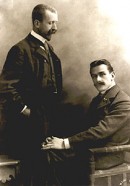 In her recent review of Geoff Dyer’s new novel (above), Sarah Douglas makes reference to Thomas Mann, whose Death in Venice
In her recent review of Geoff Dyer’s new novel (above), Sarah Douglas makes reference to Thomas Mann, whose Death in Venice is clearly echoed in Dyer’s work.
Thomas’ brother Heinrich (at left, standing, with Thomas) is the focal point of Evelyn Juers’ House of Exile, which seems to have been published only in Australia so far. The book follows Heinrich and his second wife, Nelly Kroeger-Mann, as they flee 1930s Germany for France and eventually Los Angeles. Other historic characters in the cast include Virginia Woolf, Bertolt Brecht, and Joseph Roth. The TLS recently published an approving review:
It’s a very personal book: idiosyncratic, a little wandering, and finally scintillating and rather magical and a triumph. . . .
A third of the way into her book, with Hitler in power, and exile the order of the day, Juers evolves a different method. She has largely assembled her personnel by now; she confines herself to giving updates, going from one to another in strictly chronological order, each chapter is a calendar year, and this is where her book . . . really comes into its own, so that I would wish it many thousands of readers. . . . It is amazing how those years, and those people, and those dramas all live in her pages.
And of course, there’s Heinrich’s more famous brother:
There is, first and foremost, Thomas Mann, a creature of such superb habit and indurated routine as to have made himself – as though belonging to another species – almost impervious to distraction: a few magniloquent sentences in the morning, soup (teeth trouble) and a cigar at lunchtime (“smoked Personality cigars”); in the afternoon, correspondence and a walk with one of a relay of the dogs of those years (in another Windsor touch, one was driven to him, cross-country, by Sybille Bedford; in addition, “Thomas was always a keen recorder of the dogs he met”); in the evening, gramophone music or reading aloud or a trip to the theatre and then taking down whatever book it was time for (“Thomas read Rimbaud”) . . .
An Australian blogger also offers an enthusiastic recommendation:
Juers’ writing sings, her quiet asides about research never detracting from the drive forward, but enriching the conversational tone of this remarkable piece of literary life-work. It’s a work of great love as well as of scholarship, I think.

